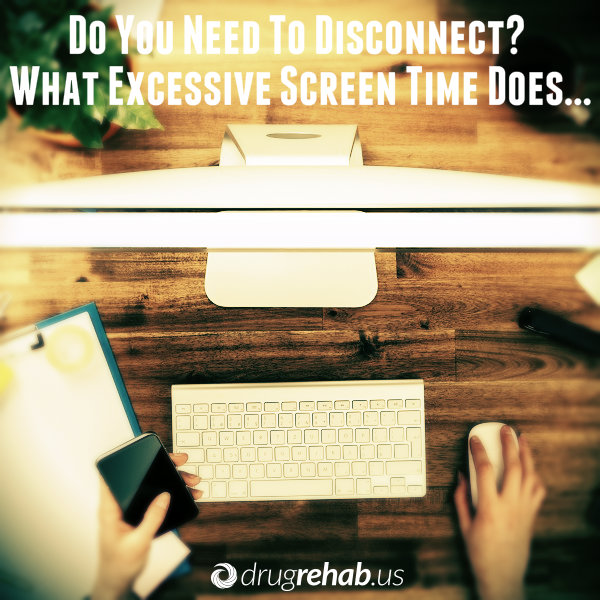Do You Need To Disconnect? Excessive Screen Time Makes Us Anxious, Saps Creativity
A new study has investigated the widespread use of cell phones and smartphones in the U.S., leading many experts to suggest taking some time out of each day to disconnect in order to protect against the potentially addictive effects of technology use. The findings may be a little basic—focusing about as much on connection problems and telemarketing as potential markers of addiction—but they still serves as a wakeup call to the impact cell phones may be having on both American youth and adults.
So does the risk of Internet and technology addiction mean you might need to disconnect? The evidence seems to say so, but precisely defining these addictions is harder than it might seem.
Cell Phone Use And Time Staring At Screens
 The most basic finding from the research is that 90 percent of American adults have a cell phone, and 58 percent have a smartphone. In addition to many more mundane findings, the results strongly hint at a problem with excessive smartphone use.
The most basic finding from the research is that 90 percent of American adults have a cell phone, and 58 percent have a smartphone. In addition to many more mundane findings, the results strongly hint at a problem with excessive smartphone use.
In particular, the survey revealed that 44 percent of cell phone owners have slept with their phones next to their beds so that they wouldn’t miss calls, texts or other updates through the night. Over two-thirds of cell phone owners check for messages or updates even if their phones don’t ring, sound a tone or vibrate, and about three in 10 say they couldn’t imagine living without their phones.
Americans spend an average of seven hours and 24 minutes staring at screens each day, and for 8- to 10-year-old children, the average is eight hours. Teens spend the most time looking at screens on average, reaching a huge 11 hours per day.
An Overstimulated State
The increasing use of cell phones has many direct impacts, relating to both being connected and spending so much time looking at screens. Constant checking of your cell phone can make it harder to fall asleep, keeping your brain in an anxious, overstimulated state. This same effect occurs when messages you send aren’t responded to quickly—you find yourself checking your phone and possibly worrying that your message didn’t come across as intended. Research suggests that staring at screens makes people less creative and less productive.
There are also more obvious consequences of excessive cell phone use, in particular spending less time socializing with people in real life or engaging in hobbies. Even when people do socialize, it’s becoming increasingly common for a group of people to sit staring at their screens while ignoring the people around them.
Technology And Internet Use As Addictions
Internet addiction has yet to be officially acknowledged as a condition by the Diagnostic and Statistical Manual of Mental Disorders (the DSM), but most experts—who are seeing increasing numbers of people seeking help for technology and Internet addictions—accept its existence. It might seem counterintuitive that an addiction can persist without a substance, but addiction really comes down to the effect something has on the brain, and other behavioral addictions such as gambling addiction have gained widespread acceptance because of these addiction-like effects on the brain.
Looking at the definition of addiction in a broad sense also reveals the striking similarities with excessive Internet and technology use. Addictions of any kind are characterized by an inability to control how often you engage in an activity, feeling urges or cravings to engage in the activity and continuing with it despite negative consequences.
Internet and technology addicts run into problems with work and school when they’re unable to stop surfing the Internet or using their devices. They may also jeopardize relationships and suffer withdrawal-like symptoms when they’re disconnected.
The similarities are hard to deny, but there are still some problems with classifying technology or Internet use as an addiction. First, the Internet (and technology used to access it) often serves as a method to access other addictive media, like pornography, online casinos or video games, so it’s hard to pin down whether somebody is addicted to the Internet or something else that’s accessed online. Additionally, it’s difficult to define just how much use is too much.
These problems are more technical than anything, however. Real-world examples of people ruining their lives over excessive Internet or technology use and being unable to stop speak volumes about the problem. Clearly, something unusual is going on.
Disconnecting To Protect Against The Risk
Internet and technology addiction are almost certainly real conditions, and we need to take the risks seriously because the vast majority of Americans now use Internet-equipped devices. Although full-blown technology or Internet addiction won’t affect most of us (like most addictions won’t), taking steps to guard against overuse is a prudent move. Many experts recommend simply disconnecting for an hour each day, preferably before bed, but doing so any time throughout the day is beneficial. There are apps designed to help you limit the time you spend on your smartphone.
There are many similar approaches available that are suitable for less severe cases, and many more professional counseling or rehab programs if you’re struggling with a more serious addiction. As we continue to spend more and more time online, thinking about the extent of our use and its consequences is becoming increasingly important.
Read Our Other Intriguing Posts On Internet Addiction



